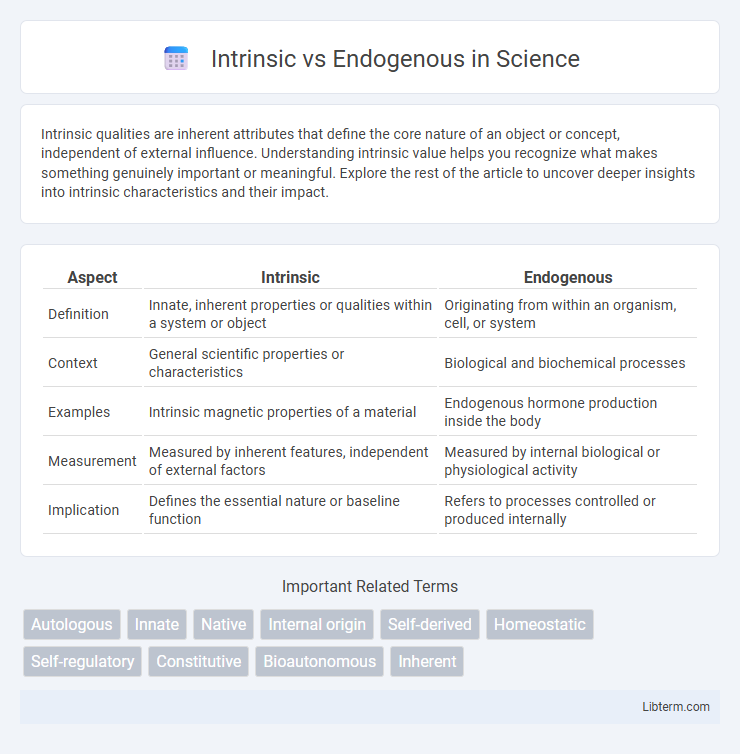Intrinsic qualities are inherent attributes that define the core nature of an object or concept, independent of external influence. Understanding intrinsic value helps you recognize what makes something genuinely important or meaningful. Explore the rest of the article to uncover deeper insights into intrinsic characteristics and their impact.
Table of Comparison
| Aspect | Intrinsic | Endogenous |
|---|---|---|
| Definition | Innate, inherent properties or qualities within a system or object | Originating from within an organism, cell, or system |
| Context | General scientific properties or characteristics | Biological and biochemical processes |
| Examples | Intrinsic magnetic properties of a material | Endogenous hormone production inside the body |
| Measurement | Measured by inherent features, independent of external factors | Measured by internal biological or physiological activity |
| Implication | Defines the essential nature or baseline function | Refers to processes controlled or produced internally |
Understanding Intrinsic and Endogenous: Key Definitions
Intrinsic attributes refer to qualities or properties inherent to an object or organism, existing naturally and independently of external influences. Endogenous factors originate from within a system or organism, driving internal processes such as genetics or metabolic activities. Understanding intrinsic versus endogenous distinctions is crucial in fields like biology and psychology to differentiate between inherent traits and internally generated influences.
Historical Evolution of the Concepts
Intrinsic and endogenous concepts have evolved distinctly in philosophical and scientific discourse, shaping the understanding of causality and origin within various disciplines. The intrinsic notion originally emerged in metaphysics to describe inherent properties essential to an entity, while endogenous developed in biology and economics to denote factors originating from within a system. Historical progression shows intrinsic emphasizing essential qualities in classical philosophy and endogenous gaining prominence in modern scientific models explaining internal causative mechanisms.
Intrinsic Factors: Meaning and Examples
Intrinsic factors refer to internal characteristics or qualities inherent to an individual, object, or system that influence behavior or function without external intervention. Examples include genetic makeup, metabolism, and psychological traits such as motivation or resilience. These factors play a crucial role in determining outcomes by driving natural processes and innate responses.
Endogenous Factors: Meaning and Examples
Endogenous factors are internal elements originating within an organism, system, or process that influence its function and development. Examples of endogenous factors include genetic mutations, hormonal fluctuations, and metabolic activities that regulate growth, behavior, and disease susceptibility. These internal components contrast with external influences, highlighting the significance of inherent biological and physiological mechanisms in shaping outcomes.
Distinguishing Between Intrinsic and Endogenous
Intrinsic properties originate within an entity itself, reflecting inherent characteristics such as color or density, while endogenous factors arise from internal processes, like hormones or genetic expression influencing behavior. Distinguishing between intrinsic and endogenous involves understanding whether a trait or influence is a fixed, inherent quality or a dynamic result of internal mechanisms. Accurate differentiation is critical in fields like biology and psychology for targeting interventions and understanding underlying causes.
Roles in Biological Processes
Intrinsic factors originate within cells or tissues, directly influencing cellular functions such as gene expression, protein synthesis, and metabolic pathways essential for homeostasis. Endogenous elements encompass all internally produced substances, including hormones and enzymes, that regulate physiological processes and maintain system-wide balance. Understanding the distinction clarifies how biological systems integrate localized intracellular activities with broader organismal regulation.
Influence in Psychology and Behavior
Intrinsic motivation originates from within an individual's inherent interests and values, driving behaviors aligned with personal satisfaction and self-determination. Endogenous factors in psychology refer to internal physiological or genetic influences that affect mood, cognition, and behavior independently of external stimuli. Understanding the interplay between intrinsic motivation and endogenous mechanisms is crucial for developing effective interventions targeting behavior change and mental health.
Applications in Medicine and Health
Intrinsic factors in medicine refer to elements originating within the body, such as genetic predispositions influencing disease susceptibility, while endogenous factors involve substances produced internally, like hormones or enzymes affecting physiological functions. Understanding intrinsic genetic markers aids in personalized medicine by tailoring treatments to individual risk profiles, whereas endogenous biochemical pathways are targeted in drug development to modulate disease processes. Both intrinsic and endogenous components are crucial for advancing diagnostics, therapeutic strategies, and precision health interventions.
Impact on Research and Diagnostics
Intrinsic factors, originating within the system itself, provide researchers with baseline data crucial for understanding natural biological variability, enhancing diagnostic accuracy by distinguishing inherent traits from pathological changes. Endogenous elements, generated internally but influenced by environmental and systemic conditions, offer insights into dynamic physiological processes, enabling more precise identification of disease mechanisms and progression. Differentiating intrinsic and endogenous components improves the reliability of biomarkers, leading to more targeted therapeutic strategies and personalized medicine approaches.
Future Perspectives and Ongoing Debates
Future perspectives in the intrinsic versus endogenous debate emphasize advancements in molecular biology and neuroscience to clarify the distinct roles each plays in physiological processes. Ongoing research explores how intrinsic mechanisms, inherent to cellular machinery, interact with endogenous factors produced internally but influenced by environmental cues, contributing to complex system regulation. Emerging technologies like single-cell sequencing and real-time imaging are driving deeper understanding, fueling debates on their relative contributions to development, disease progression, and therapeutic targeting.
Intrinsic Infographic

 libterm.com
libterm.com